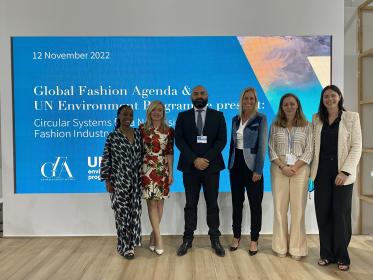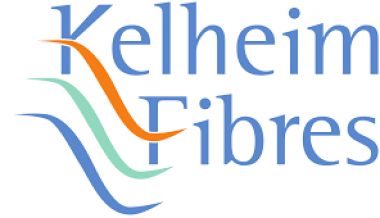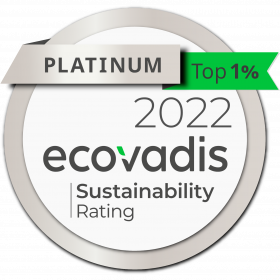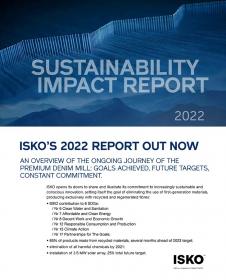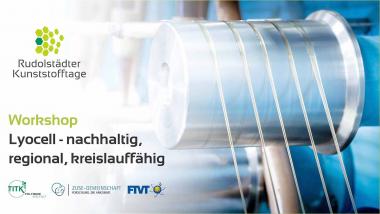Trendbörse EuroShop 2023
- Materials & Surfaces: was Design in schwierigen Zeiten bewirken kann
- Nachhaltigkeit ist Leitgedanke
- Natur und Harmonie als Rezept gegen Krisenmodus
- Custom-made Design gewinnt
Aufgeschäumtes Aluminium, transluzente Betonflächen oder filigrane Gespinste, die das Gewicht massiver Steinbrocken zu balancieren scheinen – die Inszenierung von Shopping-Erlebnissen spielt gern mit dem visuellen Wow. Die Dimension Materials & Surfaces der EuroShop, the World’s No. 1 Retail Trade Fair, vom 26. Februar bis 02. März 2023 in Düsseldorf, ist Trendbörse und Inspiration für Store-Architekten, Ladenbauer und Kreative.
Veränderte Vorzeichen, innere Werte
Der Rahmen für den klassischen Einkaufsbummel hat sich verschoben, der andauernde Krisenmodus stellt das stationäre Shopping vor neue Aufgaben – und damit auch die Hersteller von Ladenbau-Werkstoffen. „Im Vergleich zu der Zeit vor Corona ist es heute nicht mehr nur das Ziel der Planer, die Kunden durch eine angenehme Atmosphäre möglichst lange zum Verweilen im Shop zu bringen, sondern sie durch eine gewisse Leichtigkeit und Einfachheit von den vielen Alltagssorgen abzulenken“, analysiert Klaus Monhoff, Leiter Dekor- und Designmanagement bei Egger Holzwerkstoffe. Lebendige Feelgood-Szenarios sind gefragt und geprägt von „Überraschung, Individualisierung, Kreativität, Erlebnis, Innovation, Sinnlichkeit, Komfort“, so Eleonora Zappanico, Marketing Operation Manager beim italienischen High-Tech-Textilspezialisten S.I. Srl. Allen Details, die die Sinne berühren, kommt wachsende Beachtung zu, auch eine samtig-schmeichelnde Oberfläche ist haptische Willkommensgeste und erhöht die Aufenthaltsqualität in einem Store.
Die funktionalen Eigenschaften nehmen allgemein an Bedeutung zu, es werden performante Alleskönner für reibungsarme Prozessabläufe gesucht: Robustheit für eine erhöhte Langlebigkeit, gut desinfizierbare, leicht zu reinigende und Antifingerprint-Oberflächen. Dekore und Werkstoffe sollen vielseitig einsetzbar und super miteinander kombinierbar sein, alles flexibel, schnell verfügbar und in größtmöglicher Vielfalt.
Während die „inneren Werte“ an Relevanz zunehmen, tritt die plakative Optik etwas in den Hintergrund zugunsten gemäßigterer Oberflächen. Hölzer haben nicht mehr die ganz markante, rustikale Maserung, reines Weiß wird seit Corona von gebrochenen Tönen und warmer Farbigkeit abgelöst, eine gewisse Reduktion beim Design ist allseits erkennbar, Harmonie gewinnt.
Vom Charme der Natur
Warme Holzoptiken, Beton-Look, Stein- und Mauerwerk-Verkleidungen an Wänden, Böden und den Ladenmöbeln – naturnahe, authentische Oberflächen passen nach wie vor ins Bild. Auffällig ist, dass typische Outdoor-Texturen zunehmend in die Innen- und Ladenräume wandern und die Grenzen zwischen Außen und Innen aufheben. „Farben und Materialien aus der Natur, die das Einkaufserlebnis bereichern, sind ein Trend, der im biophilen Design seinen maximalen Ausdruck findet“, so Francesco Maffei vom italienischen Fliesenhersteller Ceramiche Keope. Ein „Raw Earth Effect“ wurde bei Keope der Bodenfliesen-Serie ‚Geo‘ zugrunde gelegt: Fliesen mit Toneffekt, die die optische Unvollkommenheit von Erde in ihr – dabei sehr elegantes – Design übersetzen.
Bei imi surface design, Spezialist für originalgetreue Oberflächen wie z.B. Beton-, Rost-, Altholz- und Steinoptik für unterschiedliche Trägermaterialien, ist eine schöne helle Kalkstein-Optik als biegbare und versiegelte Variante neu im Programm. Mit herkömmlichem Tischlerwerkzeug zu verarbeiten, lassen sich damit Wände, Böden und selbst Möbelstücke in der eigentlich spröden, porösen Textur von Kalkstein gestalten, die dann aber eben nicht bröseln und bröckeln, sondern die im Ladenbau erforderliche Festigkeit und Strapazierfähigkeit aufweisen.
Neue Hölzer
Diversifizierung kennzeichnet die Holzoptiken. Bisher dominierten im Ladenbau die Klassiker Nuss und Eiche, nun sei die Zeit reif für neue Akzente, so David Lahnsteiner aus der Dekorentwicklung bei Kaindl, Hersteller von Dekor- und Schichtstoffverbundplatten und -Böden. „Schön, ausgewogen und elegant setzen die Nadelhölzer Abies, Polar Pine und Fichte neue Trends im Interior-Design.“ Beim Bestseller Eiche wird die Hell-Dunkel-Skala ausgebaut. „Die Dekorfamilie der Eiche Evoke zeigt schier grenzenlose Möglichkeiten im Bereich „Dark & Light“. Die fast schwarze "Infinity" greift den aktuellen Trend nach dunklen homogenen Holztönen auf, die helle jugendliche "Light“ mit ausgeprägten Farbkontrasten ist die perfekte Kombination zu vielen Uni-Farbtönen“, so Lahnsteiner.
Besonders authentisch wirken Naturoptiken auf Trägermaterialien durch eine dekorgleiche dreidimensionale Strukturprägung – die sog. Synchronprägung oder Synchronpore, die die Textur von Stein und Beton oder die charakteristische Maserung von Hölzern auch haptisch hervorhebt. Bei Egger Holzwerkstoffe hat man noch einen draufgesetzt und unter dem Namen ‚PerfectSense Feelwood‘ die Synchronporen-Oberflächen mit einem matten Lackfinish und Anti-Fingerprint-Eigenschaft veredelt – auf einem emissionsarmen Holzwerkstoffträger mit Recyclinganteil.
Design 4.0
Helles Holz an Betonoptik, Marmoreffekte neben hochglänzendem Farblack, derber Bruchstein kombiniert mit changierendem Acrylglas oder auch Spiegelrelief – in unüblichen Materialkontrasten, die die Sehgewohnheiten überraschen, liegt Innovationspotenzial. „Dass die Designs Aufmerksamkeit erregen, jedoch nicht vom Produkt ablenken, und etwas Besonderes sind, das man nicht überall sieht, das sind die Herausforderungen für Store-Architekten“, so Julian Theisen, Geschäftsführer bei Sibu Design, österreichischer Spezialist für Design-Paneele. Lebendige Oberflächen der Design-Panels, Reliefs und Strukturen, samtig-matte Oberflächen sind bei Sibu Design im Fokus. Auch „Spiegeloberflächen in den verschiedensten Farben, glatt bis grob strukturiert, sind nach wie vor sehr gefragt. Besonders oft stellen wir die genauen Farben des Corporate Designs nach; von der Spiegel- bis zur Stoffoberfläche. Auch der Anteil an gedruckten und gestanzten Logos steigt an“, ergänzt Theisen. – Customizing, einzigartige Details, die sich abheben, individuell konfektionierte Elemente gewinnen an Bedeutung.
Fundstücke aus der Manufaktur
Store-Design im gehobenen Level greift verstärkt auf (kunst)handwerklich Gefertigtes aus Manufaktur-Betrieben zu, um sich gegenüber Wettbewerbern, Mainstream und Discount zu profilieren. Auch diesbezüglich wird man auf der EuroShop 2023 reichlich fündig. Etwa bei der Glashütte Lamberts aus Waldsassen. Die Faszination mundgeblasener farbiger Flachgläser, die zunächst in der hochwertigen Architektur, internationalen Hotels und bei Luxusmarken Anwendung fanden, haben inzwischen auch die Gastro-Szene, Bäckereien und Handelshäuser für sich entdeckt. Sie kommen für Vitrinen, Glasgestaltung für Trennwände und hinterleuchtete Wandverkleidungen, Deckenverglasungen (Kuppelverglasungen, etc.) und Design-Leuchten, Tresen, Möbel, Tische, Fassaden und Fenster zum Einsatz.
Auch die Zahna-Fliesen GmbH ist so ein Manufaktur-Betrieb, der in Handarbeit mehrfarbige unglasierte Fliesen nach historischem Vorbild in Kleinserien herstellt. Oder auch das portugiesische Pendant Viúva Lamego, das neben industrieller Stückzahl-Fertigung auch die portugiesische Tradition der handbemalten Taylor-made-Fliesen lebendig hält. Durch Kollaborationen mit internationalen Künstlern und Architekten werden neue Einsatzgebiete ausgelotet und z.B. Wandfreskos aus Fliesen – modern bis retro – für Gasträume realisiert.
Auch die filigranen High-Tech-Vorhänge und Raumteiler aus Textil oder Kettengliedern von Herstellern wie i-mesh oder Kriskadecor seien hier erwähnt. Deren semitransparente Szenografie dient in Store-Konzepten hochkarätiger Marken wie Dior, Natuzzi und den niederländischen Luxus-Warenhäusern von de Bijenkorf als Struktur- und Design-Element.
Flexibel, digital und crossmedial
Flexibilität ist auch bei Material-Anbietern zum zentralen Stichwort geworden. Digitalisierung und Technologie-Einsatz erfordern von Läden flexiblere, wandelbare Einrichtungskonzepte und mehr Eventcharakter, Ladenräume werden häufig als dynamische, multifunktionale und vielseitig nutzbare Umgebungen konzipiert. Daher sind Lösungen gefragt, die einen schnellen Umbau erlauben. Sibu Design etwa bietet Dekorplatten mit Magnetrücken, die perfekt geeignet sind, um mit wenigen Handgriffen umzudekorieren und ein frisches Ambiente zu erzeugen.
Auch ein Fotoboden – fotorealistisch bedruckbarer Vinyboden von visuals united – wird nicht mehr nur als „Kundenstopper“ und temporäre Werbefläche am POS eingesetzt, berichtet Silke Hüsgen von der visuals united AG. „Mutige Kunden nutzen ein kreatives Design auf einem Fotoboden in Kombination von Augmented-Reality-Content, um die analoge Welt am POS mit der digitalen zu kombinieren“, so Silke Hüsgen von der visuals united AG. Denn: „Die letzten Jahre haben die Welt auf den Kopf gestellt. Nicht nur die Pandemie, auch die Auswirkungen des Ukraine-Kriegs erfordern neue bzw. andere Produktions-, Kommunikations- und Vertriebswege. Vom Retail fordert diese Situation zukunftsweisende Lösungen in den Bereichen ‚Nachhaltigkeit‘ und einen ‚crossmedialen POS‘.“
Recycling-Design auf grünen Wegen
Ausnahmslos alle Hersteller von Fliesen, Holz- und Verbundwerkstoffen, Dekorpaneelen und Sonderprodukten für den Ladenbau haben es auf dem Schirm: Die aktuell größte Herausforderung ist, ressourcenschonende Prozesse und nachhaltige Produkte und mittelfristig den Umbau zu geschlossenen Material- und Produktionskreisläufen anzustoßen und damit tragfähige Zukunftsperspektiven für den Ladenbau zu entwickeln, der von Wechsel und Veränderung lebt und damit nicht ganz optimal zu Nachhaltigkeit und Zirkulärwirtschaft passt. Sollte man meinen. „Würden wir ganz anders betrachten, denn unter dem Nachhaltigkeits-Aspekt müsste die beschichtete Spanplatte eigentlich einen Umwelt-Nobelpreis bekommen“, räumt Klaus Monhoff von Egger Holzwerkstoffe ein. „Begonnen bei der Herstellung, bei der schon ein hoher Anteil Recyclingholz eingesetzt wird, kann die Platte nach der Verwendung zum Ende des Lebenszyklus auch wieder zu 100 Prozent recycelt werden und bleibt also komplett im eigenen Umweltkreislauf.“
Eine Reihe marktfähiger ‚Win-win-Lösungen‘, die die Anforderungen an Umweltverträglichkeit mit den qualitativen Anforderungen von Store-Architekten zusammenbringen, präsentiert Bencore, italienischer Hersteller von Verbundplatten und Mitglied des Green Buiding Councils Italia, dem dortigen Verband für nachhaltiges Bauen. Darunter ‚Wasbottle‘, ein Kunststoff aus recycelten Kunststoffflocken, der gemeinsam mit Autogrill entwickelt wurde, um den anfallenden Abfall des Travelfood-Unternehmens wiederzuverwerten. Das Schmelzen und Verpressen der bunten Flocken kreiert eine ganz eigene Recycling-Ästhetik in fröhlich bunter Terrazzo-ähnlicher Anmutung, die sich sehen lassen kann. Kommentar Bencore: „Wir sind der festen Überzeugung, dass die Herstellung von recycelten und recycelbaren Produkten ein Muss für Marken und Lieferanten sein sollte.“
EuroShop Messe Düsseldorf















